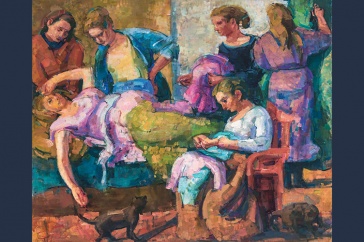
The students Kimberly Piper Stoddard '93 teaches range in age from 17 to 70. Classes for men are separate from those for women. Approximately 90 percent of her students will eventually be released from prison; the remaining 10 percent are lifers.
Stoddard teaches English to inmates at the state prison in Concord. Just recently she was named New Hampshire’s 2020 Teacher of the Year. For someone who spent most of her career teaching middle school, the last four years at Granite State High School have offered a different perspective. And not just because the classroom is behind bars.
“Every individual is on his or her own journey and own lifepath. We all make choices, but everyone deserves another chance, and they will take that chance when they are ready.”
“I’d say the position I have now is easier in some ways than teaching middle school,” says Stoddard, who earned her bachelor’s degree in English teaching and master’s in education at UNH. “The main difference is that my current students choose to come to class. In middle school, social life becomes more important and students don’t always want to be in class. The students I have now want to be there.”
And while the basics of the curriculum are the same as any other English course Stoddard has taught before, the experience often is not, partially because previously, the classrooms were not separated by gender.
“When I teach 'To Kill a Mockingbird' to women inmates, the conversations tend to focus around Scout’s coming of age, and what it means to be a lady,” Stoddard says. “The discussions are quite different with men; every class is different.”
Class sizes are much smaller at Granite State High School, which isn’t a stand-alone school building, but rather rooms that share a floor in the men’s prison with the chapel and the mental health office. Levels of learning also differ.
“I might have someone who is reading at a sixth-grade level in the same class as someone who has a master’s degree,” she says. “The real benefit is the small class size allows for individual attention.”
Students who don’t have one can receive an actual high school diploma; those who have graduated are welcome to take courses, too. Terms run for 11 weeks with two weeks off between quarters. Each quarter students can sign up for as many as four classes a day.
“They can take a quarter off if they want to, or if they have a job, they can go to school in the morning and work in the afternoon; there’s a lot of flexibility,” Stoddard says. “That’s one of the things that makes it work.”
The New Hampshire resident teaches courses in American literature, world literature, Shakespeare and creative writing, among others. There are no restrictions on what students can write about, but she does set boundaries by telling them that if it’s something they wouldn’t want the security staff to read, they probably shouldn’t write it. Many student-inmates at Granite State High write about what many high school students write about: themselves.

“Most often I see students reaching back in time, prior to being incarcerated. They write stories about the bike they really wanted for Christmas and didn’t get, or the puppy they had when they were 7 years old,” Stoddard says. “One man in his sixties wrote a story about his first dog. These personal narratives help them to remember that their incarceration and the crime they committed isn’t all they are.”
Stoddard was teaching at a middle school when she saw an ad for the English teacher opening at the prisons. Feeling ready for a change, she didn’t hesitate to apply.
“I was always drawn to the at-risk kids, the kids who had no one else in their corner,” Stoddard says. “They kind of drew me in and made me want to reach them. This seemed like an extension of that.”
“Every teaching experience I’ve had has taught me something,” she continues. “Each one has its rewards and challenges. Here I’m working with people who are taking control of their lives in a situation where they have very little control. And meeting with their families at graduation is especially rewarding.”
As to what working with this population has taught her, Stoddard says, “Every individual is on his or her own journey and own lifepath. We all make choices, but everyone deserves another chance, and they will take that chance when they are ready.”



















































